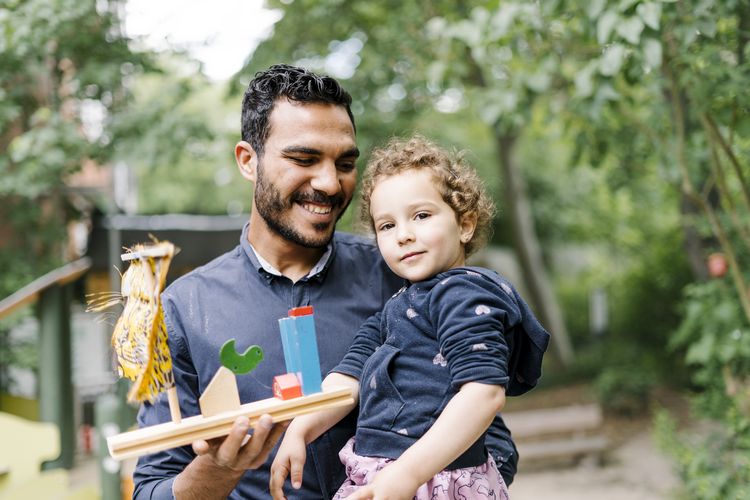
Advice and service
The Family Office for Students offers information and counselling services for students with children and expectant mothers and fathers. Here you will also find contact persons for further questions regarding family care work, such as caring for relatives.
We see the family as a social network in which people with close personal ties - also across generations - take responsibility for each other. This naturally also includes single parents, carers, non-marital and queer partnerships as well as patchwork and foster families.
We advise you on the following topics, among others:
Counselling appointments are possible by telephone, email or in person at the university by individual arrangement. Please contact us by email at familieundstudium(at)hs-bremen.de
The Central Student Advisory Service advises international students and prospective students on all questions relating to studying at HSB. However, it is not only questions about the content of your studies or admission requirements that play an important role: we also support you in all other areas of life during your stay in Germany. Please contact FIT@hs-bremen.de
Consultation times:
Please use the appointment planner to arrange personal consultation appointments with me.
If you cannot find a suitable appointment, please contact me at familieundstudium@hs-bremen.de.
In the state of Bremen, the Easter and autumn school holidays and large parts of the summer school holidays overlap with the teaching and examination periods of the universities this year. This is a particular challenge for those of you who have children of school age and/or in and kindergartens. As a university, we are in the process of developing support options to ensure that you all have a good start to the affected semesters. At the same time, we would like to ask you to deal with this situation at an early stage and to look into childcare options. In order to receive current offers and information, especially about the semester start in 2025, you are welcome to subscribe to a corresponding mailing list: Mailing list Studying with children
© erstellt mit KI
Did you know? Around 12% of all students support or care for relatives, family members, acquaintances or friends alongside their studies. In doing so, they make a significant contribution to society by caring for those in need of help or care, but also by ensuring the care of their own relatives.
However, care-responsibilities alongside your studies are an additional burden and can mean that you are less able to concentrate on your studies. The Family Office for Students is there for you and will work with you to find ways of providing support and relief. You are welcome to contact to us for counselling!
Pregnant? – congratulations!
Pregnancy is an exciting and expectant time, as you are on the threshold of a new phase in your life. At the same time, pregnancy brings with it one or two challenges during your studies and we, the Family Office, would like to provide you with comprehensive and competent advice and information. Ask any questions you may have and don't be afraid - especially during your first pregnancy - to talk to us about any restrictions or study problems if you would like to take advantage of our advice and support.
Every pregnancy is different and the "right" counselling for you depends on your needs. We would like to help you shape your individual path during this special period of study and find the right balance for you in order to enable you to study with as little disruption as possible.
The new Maternity Protection Act (Mutterschutzgesetz, MuSchG) came into force nationwide on 1 January 2018. For the first time, maternity protection now also applies to students.
Students who are expecting a child are encouraged to report their pregnancy. Please contact Annika Müller for further information.
Students at the City University of Aplied Sciences can be granted leave of absence from their studies in accordance with the matriculation regulations – at the earliest after the end of the first semester of study. International students can also apply for leave of absence (e.g. for pregnancy and parental leave). This could have an impact on your residence status!
It may be necessary that you are unable to take an exam during the course of your studies due to pregnancy/parental leave or illness of a child. Please inform yourself thoroughly about the possibilities, the Registrar's Office as well as the Family Office offer you advice.
Looking for a work placement? We would like to support you in your search for a suitable placement. Our website now provides an overview of the companies and organisations where HSB students have recently completed their placement. In order to find a suitable placement provider, you can specify in advance in which faculty you are studying and, if applicable, which country you are interested in.
We also recommend using Career Gate, the HSB's job portal, where you can find vacant placement positions that are specifically aimed at HSB students.
Occasionally, foundations offer financial support in the form of a scholarship, specifically for students with children.
Note for international students: Not all financial support options (e.g. parental allowance, BAföG, child benefit) also apply to foreign students with children. As the legal regulations are very complex, we recommend seeking advice from the Bremen Service University (BSU) and the Social Counselling Service of the Studierendenwerk.
Childcare on campus
In order to improve the compatibility of studies/work and family life for students and staff at Bremen University of Applied Sciences, the university supports the childcare initiatives Socke e. V. and Flummi e. V.
Pregnancy and raising children during your studies often lead to extraordinary burdens, as you have to combine your studies, housekeeping, raising children and possibly gainful employment. This gives rise to a wide range of questions, which we will be happy to answer for you personally, or you may already find your answer in the following questions.



